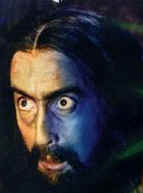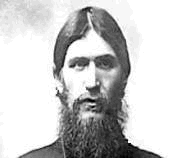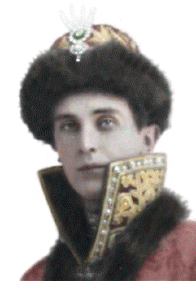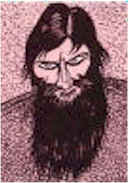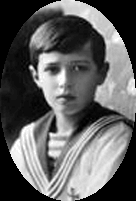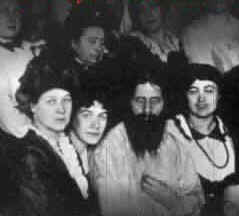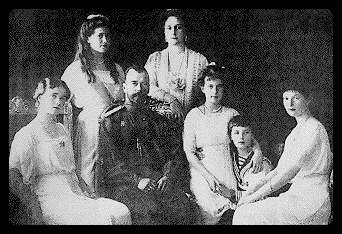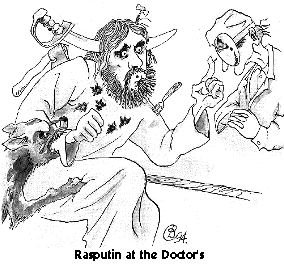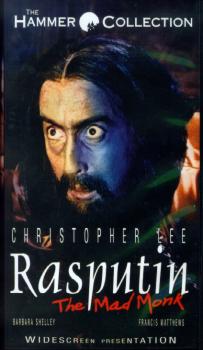| Rasputin the ‘Mad Monk Grigory Rasputin is without question one of the most scandalous figures in Russian history. This womanizing mystic from Siberia arrived in St. Petersburg in 1911 and within a few years had become one of the most influential men in government circles. He had the ability to remain in such a high position despite widely publicized bouts of drinking and womanizing. (Source: Daniel Barry-http://homepage.eircom.net/%7Epbarry/ras2/) Grigory Yefimovich Rasputin was born on January 10th, 1869 in the peasant village of Pokrovskoe in Siberia, far away from the glittering salons of the Imperial family in St. Petersburg. |
| ||||
|
Although he briefly attended school he
failed to learn how to read or write.
As
a child, Rasputin had constant visions of divine forces and magical
healing powers – he could cure a horse by touching it. While not healing,
however, the adolescent supposedly acquired the name Rasputin (meaning
'the debaucher') because of his licentious permissive conduct. (Source:
http://discoverychannel.co.uk/rasputin/) By the age of 30, Rasputin was married with four children. However, his penchant for drinking and stealing horses were at odds with a conventional life of domesticity. It was when, in response to accusations of being a horse thief, he fled the village and took refuge in a monastery that he underwent the religious conversion which was to inform the rest of his life. Changed by his spiritual experiences, Rasputin left his village to become a 'strannink' – a pilgrim or wanderer - and travelled widely in Russia and abroad. Soon after arriving in St. Petersburg in 1903, Rasputin met Hermogen, the Bishop of Saratov. He was impressed by Rasputin's healing powers and introduced him to Nicholas II and his wife, Alexandra Fedorovna. Rasputin's rise to power was due to his close relationship with Tzar Nicholas II's wife, Alexandra. Their son, heir to the throne, Alexis, suffered from hemophaelia, and only Rasputin could do what the top medical professors could not: he could stop the boy's bleeding. Because of this, Alexandra believed he was a holy man sent to protect Alexis and she kept him close by at all times, despite the fact that he rarely bathed! His Terrible Death It is well known that on the fateful day of the 16th of December 1916 , Grigory Rasputin, close friend and advisor to Alexandra, Tsarina of Russia, was brutally murdered. Twice before, people had attempted to kill him. One time a Cleric and a Bishop battered him with a crucifix. They were convinced Rasputin was getting his powers from the Devil. It was believed that Rasputin had too much influence over the Tzar and that this Siberian mystic was to blame for Russia's problems. It was at the time that the Tzar was mobilizing Russian troops for WW1, that Chionya Gusyeva, a deformed ex-entertainer with no nose, savagely stabbed him with a knife. She had been hired by Illiodor to kill Rasputin. | |||||
 Fig.2. Grigory Rasputin’s body after it was pulled from the river. |
The
historical details point to his eventual murder being committed by Prince
Felix Yusupov, V. M. Purishkevich and Grand Duke Dmitry Pavlovich.
However, the exact roles that were played out on the eventful night may
never be known.Rasputin however, didn't die easily. First, he resisted
being poisoned with Cyanide, then he was shot at close range. Left for
dead, he recovered, and attempted escape. He was then shot repeatedly, and, in a what was probably a fit of rage on the part of Felix, beaten savagely about the head with a dumb-bell handle. | ||||
| Rasputin
was then bound, driven to the Malaya Nevka river and thrown in through a
hole in the ice. It is in these freezing waters that Rasputin met his
demise - when the body was recovered it became clear that even by the time
he was thrown into the water, Rasputin was not dead, but still alive and
was desperately attempting to free himself from his bonds and
escape. The body was finally recovered from the river by the Great Petrovsky Bridge. During the autopsy on the 20th December, Rasputin's heart was removed, and was stored at the Academy of Military Medicine until its mysterious disappearance during the 1930's. The rest of the body was buried the next day. However, the grave was later reopened and the body removed. It was taken from Tsarskoe Selo to Petrograd, then again out onto the Vyborg highway in order for a secret burial, but the car became stuck, and so the the body was incinerated on a hastily created pyre at the side of the road. The ashes were scattered. (Source: Daniel Barry http://homepage. eircom. net/%7Epbarry/ras2/) |
| ||||
|
SOURCE A | |||||
|
Felix
Yusupov, Lost Splendor (1953) Then
a terrible thing happened: with a sudden violent effort Rasputin leapt to
his feet, foaming at the mouth. A wild roar echoed through the vaulted
rooms, and his hands convulsively thrashed the air. He rushed at me,
trying to get at my throat, and sank his fingers into my shoulder like
steel claws. His eyes were bursting from their sockets. By a superhuman
effort I succeeded in freeing myself from his grasp. | |||||
| His
Mystical Powers Grigori Yefimovitch Rasputin is one of the most mysterious, notorious and disputed figures in modern history. Who was this man who seemingly had strange powers and a mysterious influence over others, with eyes that many claimed changed colors when they spoke to the monk. Did Rasputin have some sort of supernatural link, as he claimed? Or was he just a perverted charlatan who had a mastery of hypnosis? It is hard to find reputable sources of information on Rasputin; most stories about him come from his daughter, or the weak-willed tsar, or easily duped peasants. |
| ||||
|
However, a few events, such as his power over the
Tsarevitch's hemophilia and his assassination
were witnessed by many parties and have been analyzed a great deal. As early as 1900, Rasputin was famous throughout Eastern Russia as a sort of faith healer and strannik, or wandering holy mendicant. Rasputin also was said to have the power of precognition, predicting events that happened months later, and clairvoyance, which is the ability to see events happening elsewhere. Many claimed to have seen these abilities at work. | |||||
|
SOURCE B | |||||
|
|
I write and leave behind me this
letter at St. Petersburg. I feel that I shall leave life before January
1...If I am killed by common assassins, and especially by my brothers the
Russian peasants, you Tsar of Russia, have nothing to fear, remain on your
throne and govern, and you, Russian Tsar, will have nothing to fear for
your children, they will reign for hundreds of years in
Russia... if it was your relations who have wrought my death, then no one in the family, that is to say, none of your children or relations, will remain alive for more than two years. They will be killed by the Russian people...You must reflect and act prudently. Think of your safety and tell your relations that I have paid for them with my blood. I shall be killed. I am no longer among the living." Pray, pray, be strong, think of your blessed family. Grigory (Grigory Rasputin) Words
written in a letter to the Tsarina Alexandra, 7 Dec 1916. | ||||
In this Walt Disney cartoon, Rasputin put a curse on the whole Romanov family. Rasputin was also said to have a strange influence over others. People reported feeling compelled to do things while in his presence, something most skeptics attribute to some form of hypnosis. | |||||
| However,
strange stories exist. The accounts of Rasputin's mysterious healing
powers are well known: One incident, which happened in 1912 is the best-known example. The Tsarevitch had badly bruised himself and was bleeding to death. The doctors assembled to care for him pronounced that nothing could be done for the boy, who lingered in this state for a few days. When Rasputin came to the tsarevitch's bedside, he waved his hands over the boy, spoke to him briefly, then stated that he was better. And, according to the many doctors and scientific skeptics who viewed this, the boy did recover. Many today guess that Rasputin used some sort of potent hypnosis to slow the boy's heartbeat, but that is mere conjecture ; several scholars dispute this idea. |
| ||||
|
|
Fig.8
Grigory Rasputin and admirers. Another incident concerns the Tsaritsa's closest friend, Anya Vyrubova. Her devotion to Rasputin was absolute, which was reinforced after a terrible derailment of the train from Tsarskoe Selo to Petersburg in which Anna was almost killed. Although she survived the accident Anna's condition was so bad her doctors despaired of saving her life; her body was crushed and mangled. Rasputin came to her bedside, stood over Anna as she lay near death. He reached out and held her hand. Dripping with sweat, intensely focused, Rasputin repeated the | ||||
|
words, "Annushka,
Annushka, rise!". The drama of the moment was incredible. Anna suddenly
awoke from her coma, opened her eyes and tried to rise from her bed. It
was a miracle. As Rasputin staggered into the next room, he spoke,
prophetically saying that although she would live, for the rest of her
life Anna would be a cripple. So it came to be. (Source:http://www.alexanderpalace.org/palace/Rasputin.html)
| |||||
| In
October of 1912, while the Tsar and his family were at their hunting lodge
in Spala, Alexei fell on the side of a bathtub. Bruising and bleeding,
Alexei was in terrible pain. The doctors could do nothing for him, and
Alexandra spent ten days without sleep at his bedside. A notice was drawn
up announcing the death of the heir. Desperate, the Tsarina telegramed
Rasputin. "God has seen your tears," Rasputin wired back. "Do not grieve.
The Little One will not die." Within hours of receiving this telegram, the
bleeding had subsided and Alexei began to recover. This incident regained
Rasputin to full favor within the Imperial
family.
(Source: http://homepage.eircom.net/%7Epbarry/ras2/) |
| ||||
His Political Power By 1903 word had reached St. Petersburg of a powerful mystic from Siberia with wild, luminous eyes and a maniacal stare. It seemed that Rasputin had timed his entry into high society just right: St. Petersburg was feverish with mysticism and was home to wild social behaviour and permissiveness. What's more the aristocracy were very enthusiastic about all things to do with the occult, and seances and Ouija boards were commonplace. He rapidly began to build an ever-expanding group of disciples and acquaintances among the upper classes. Undeterred by his mad hypnotic eyes, long dirty beard and dubious personal hygiene, 'polite society' viewed Rasputin as a ‘starets’ (holy man). |
| ||||
|
|
Reports
of Rasputin having an affair with the tsarina are patently
false;
These false rumors were spread by tabloidnewspapers
after the royal Romanov family was deposed. While Rasputin did not have an
affair with the tsarina, he did have sway over her, along with the rest of
the royal family. The tsar would often consult with the man who could heal
his son, giving Rasputin input into important royal
decisions. | ||||
Rumours began to circulate that Rasputin and Alexandra Fedorovna were leaders of a pro-German court group and were seeking a separate peace with the Central Powers (Germany and Austria-Hungary) in order to help the survival of the autocracy in Russia. Rasputin was also suspected of financial corruption and right-wing politicians believed that he was undermining the popularity of the regime. (Source:http://www.spartacus.schoolnet.co.uk/RUSrasputin.htm) How much actual power Rasputin held command of is argued by historians. Some maintain that Rasputin virtually controlled the tsar, while others say that Rasputin did not have much real political clout. Rasputin had many powerful enemies who tried to control his influence. |
| ||||
|
| |||||
| Michael
Rodzianko, the President of the Duma, later wrote about the role of
Rasputin during the War First World in his book, The Fall of the
Empire. Profiting by the Tsar's arrival at Tsarskoe I asked for an audience and was received by him on March 8th. "I must tell Your Majesty that this cannot continue much longer. No one opens your eyes to the true role which this man (Rasputin) is playing. His presence in Your Majesty's Court undermines confidence in the Supreme Power and may have an evil effect on the fate of the dynasty and turn the hearts of the people from their Emperor". My report did some good. On March 11th an order was issued sending Rasputin to Tobolsk; but a few days later, at the demand of the Empress, the order was cancelled. | |||||
|
The
source of all this influence, and the main reason people still remember
Rasputin, were the odd abilities he supposedly possessed. Rasputin gained
his greatest fame for his ability to help the Tsarevitch Aleksei stop
bleeding. | |||||
In your book under the heading: Rasputin the ‘Mad Monk’, do the following questions and activities: 1. Explain the following about Rasputin’s life: a) When and where he was born and died. b) His childhood and background . c) His talents. d) Why he was so popular with the Russian royal family. e) Why he was so popular with some circles of Russian society. f) Why he was hated and feared by other groups in the Russian ruling class. Use the above information, and also the following web site: note documents 4 and 6 in this site:- http://spartacus-educational.com/RUSrasputin.htm |
| ||||
In answering the above questions, quote from the source documents to back up or support your opinion or argument. 2. Who was the
first person that tried to kill Rasputin? 5. Go to the following site and
compare the account of his death to the ones given above.
http://www.bbc.co.uk/history/trail/wars_conflict/weapons/act_weapons_entry.shtml For Interest Study: http://topdocumentaryfilms.com/who-killed-rasputin/
| |||||
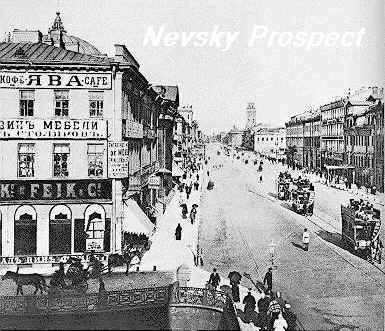
Fig.14 St. Petersburg. |
| ||||
|
top www.interactive-learning.com.au | |||||
